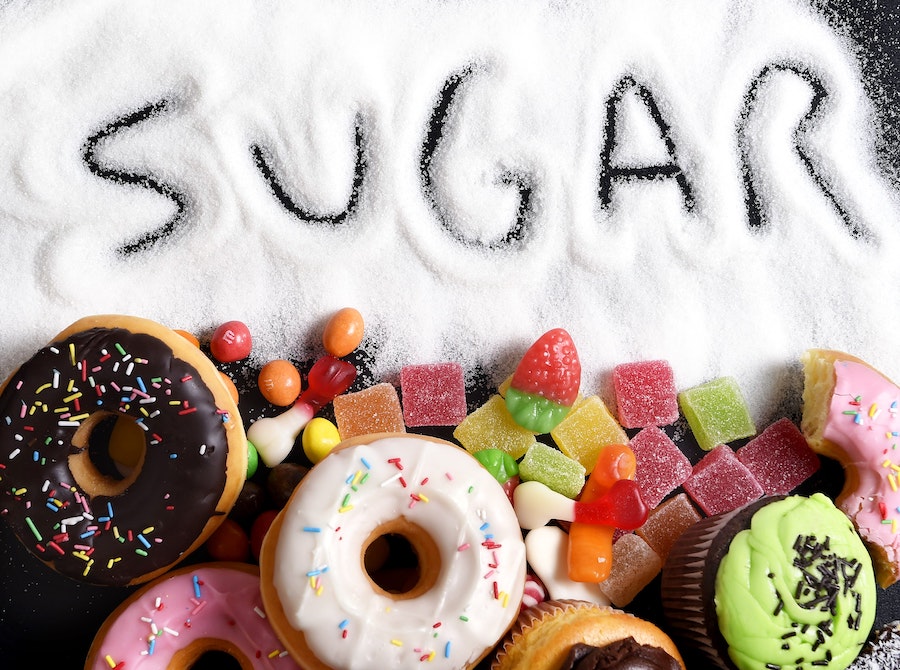Sugar Awareness Week: 7 expert tips for giving it up
Here’s how you can break up with the sweet stuff for good.
After all the fizzy drinks, mince pies and chocolates of the festive season, it’s not unusual for feel ready for health kick – especially when it comes to sugar.
Unfortunately we live in a society where sugar is hidden in practically everything and it can often go under different guises, so cutting it out is easier said than done.
Experts say that adults shouldn’t exceed a limit of 30 grams of free (added, refined) sugar a day, but many of us struggle to stick to a limit as the sweet stuff can have a powerful impact on the reward system in the brain.
As today marks Sugar Awareness Day, we’ve found some handy tips for slashing your intake…
1. Always choose the full fat option
If you’re struggling to know which foods are high in refined sugars, stick to the simple rule of avoiding low fat options.
It sounds counter-intuitive, but even snacks that seem healthy (like reduced-fat yogurts and snacks) can be high in the sweet-tasting substance.
“Low fat generally means that extra sugar and nasty additives have been added,” says Dr Michael Mosley (thefast800.com). As well as containing less sugar, he explains that full fat products will often keep you feeling fuller for longer, meaning you won’t be tempted to raid the biscuit tin later in the day.
2. Stick to water
“We all know that fizzy drinks aren’t great, but did you know that a 330ml can of Cola contains around 35 grams of sugar? That means a single can is more than the recommended daily sugar intake for adults,” says addiction expert Chris Hill (robhillfoundation.org).
He recommends sticking to good old H2O instead.
“If you feel like mixing it up, try sparkling water with a wedge of lemon and some cucumber,” adds Mosley.
3. Start reading food labels more closely
“As sugar is added to around 80% of all food and drink available to us in the supermarket today, start reading food packaging and looking out for hidden sugars to know exactly what you’re buying,” says Hill. The 30 gram limit equates to around seven teaspoons a day.
Look under ‘carbohydrate: of which sugars’ on the food labelling to get an idea of how many grams of sugar your product contains, and prepare to put it back if it’s hiding lots of added extras.
4. Learn to recognise sugar
Speaking of food labels, you’ll also want to get familiar with the long list of names that sugar can hide under.
“Sugar has around 65 different names which you’ll find on packets and within ingredients of different foods,” says Hill. “Familiarise yourself with the different names to be able to look out for them in the foods that you buy.”
Some of the most common examples are high-fructose corn syrup (HFCS), agave nectar, carob syrup, dextrin, maltose and dextrose.
5. Cook simple meals from scratch
Opting for a homemade alternatives to convenient store bought foods is the simplest way of cutting down your daily intake, and it could save you money in the long run too.
“Ready meals and sauces in jars can contain excessive amounts of sugar,” warns Hill. “Wherever possible, make everything from scratch.”
6. Be drink aware
Many of us will keep our sweets and chocolate consumption in check, but can easily lose track of the amount of drinks we consume in the pub with friends.
“Don’t forget that alcohol contains a huge amount of added sugar,” says Hill. “For example, there are just over three teaspoons of sugar in a single pint of lager.”
It’s not just alcohol you have to look out for though, many fruit juices contain huge amounts of added sugar, as do a lot of seemingly ‘healthy’ drinks such as flavoured waters.
7. Use natural sweeteners
Instead of adding refined sugars to dishes, thank about naturally sweetening them with fruit or spices like cinnamon.
“You could add banana to cakes or grated apple and dried fruit to porridge,” says registered dietitian Harriet Smith (@surreydietitian).
7. Watch your five a day
Fruit contains natural sugar, rather than refined, added sugar, but it’s still wise not to overdo it – particularly if you’re trying to lose weight.
“Fruit is good for you in many ways as it delivers valuable nutrients and vitamins to your body, but it’s important to be aware of the sugar content of different fruits,” says Hill.
“Keeping consumption of the high sugar varieties to a reasonable level is important.”
He suggests eating less high sugar fruits and sticking to low-sugar varieties. “Fruits that contain little sugar are strawberries, raspberries, blueberries, avocado, watermelon, grapefruit, kiwis and oranges, so there’s a lot to choose from.”
The Press Association
Latest posts by The Press Association (see all)
- Special stamps to mark 80th anniversary of VE Day - April 24, 2025
- Test your knowledge with our penguin-themed quiz - April 24, 2025
- Prince Louis shows off missing front teeth in new photo to mark seventh birthday - April 23, 2025
- Why does hearing get worse as we get older? - April 23, 2025
- Top scented plants for your garden, from a Kew expert - April 22, 2025



















